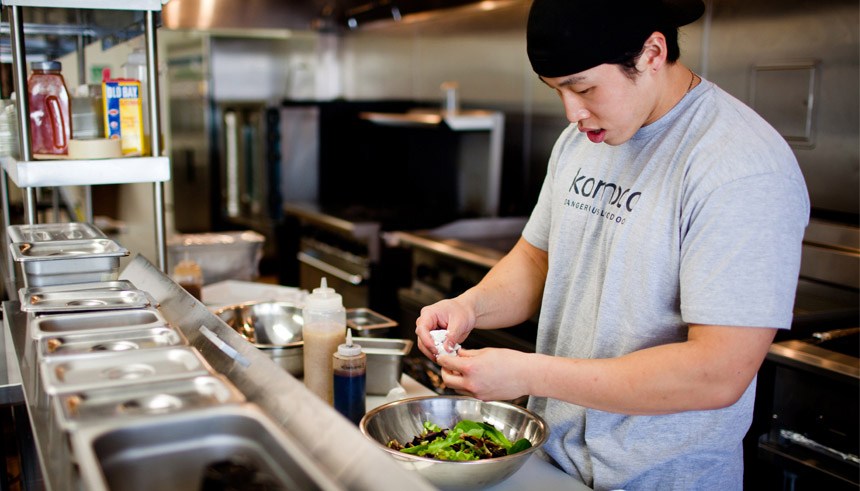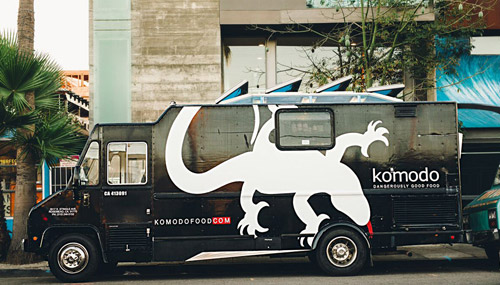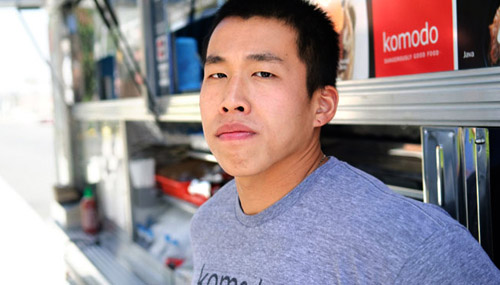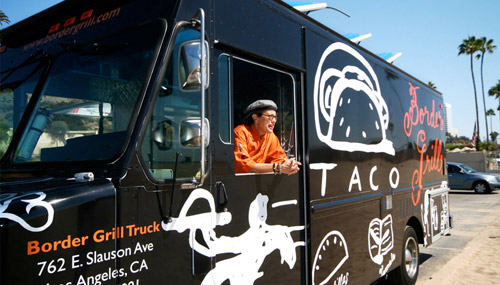East West Lifestyle
Gourmet Food Trucks Become Culinary Empire Incubators
By Vicki Torres

Today's food trucks are hip business incubators and vehicles for marketing brick and mortar restaurants.
As a Chinese-Indonesian immigrant, Erwin Tjahyadi ate his mother's Southeast Asian home cooking and tacos in his East Los Angeles neighborhood. He drew on this background, when, as an out-of-work chef with classical training, he created Komodo Food Truck in 2009.
Today, with two Komodo cafés and the truck, Tjahyadi exemplifies the East-West fusion in Los Angeles that spawned the modern gourmet food truck industry.
"My partners Mike Cho and Thomas Choi are Koreans from Maryland, so . . . we're very L.A.," Tjahyadi said. "Different transplants from diverse backgrounds and cultural inspirations coming together to create unique mashups - L.A. is truly the perfect place for East-West fusion."

Los Angeles birthed the modern food truck industry in 2008 when the construction industry faltered during the economic downturn. Dozens of "taco trucks" that had fed blue-collar laborers were suddenly idled and selling at discount prices, said Matt Geller, head of the Southern California Mobile Food Vendors Association.
Out-of-work and laid-off chefs snapped up the trucks and used Twitter and other Internet sources to promote their food, he said. Part of the appeal was the online and on-site dining community the trucks created, as well as the experimental, East-West fusion cuisine.
"If Roy Choi, five or 10 years ago, had said he wanted to start a Mexican-Korean restaurant, [investors] would have laughed in his face and told him to get out," Geller said.
Instead, Choi and his Kogi BBQ truck in Los Angeles became one of the acknowledged creators of the modern food truck movement in the United States. Geller's organization helped nurture that movement in Southern California with legal action against 13 Southern California cities with restrictive food-truck regulations. 2,700 licensed food trucks operate in LA County (traditional lunch trucks, taco trucks, movie production trucks, etc.) of which 300 are (self-declared) gourmet food trucks.
For Tjahyadi, his Komodo food truck was initially a way for him to make quick money, be creative and start a new chapter in his life. "Never did we imagine that it would be ‘trendy' or ‘hip' to eat out of a truck," he added.

"Never did we imagine that it would be ‘trendy' or ‘hip' to eat out of a truck."
That hipness has led to brick-and-mortar restaurants for many chefs, including Tjahyadi, with Komodo Cafes in Venice, Calif., and on Pico Boulevard in Los Angeles.
Komodo's first ever brick and mortar establishment in Los Angeles stemmed from the success of its gourmet food truck operations.
Food trucks have expanded to other cities both nationally and internationally, and have spawned television competition shows, Zagat reviews and the movie "Chef," on which Choi was a consultant.

For entrepreneurs, food trucks now serve as an incubator business, "the first step in a larger culinary empire," Geller said. Even existing restaurants have hopped on board the trucks in a reverse move, like Border Grill. In operation since 1985 and with four restaurants and a location at the Los Angeles airport, Border Grill fields two food trucks. They expose more diners to the restaurant's fare at a lower price point, said co-chef and co-owner Susan Feniger.
"The truck also provides an additional marketing component to our brand, creating higher visibility as it drives around Southern California," Feniger added. "And [it] allows us to cater more events and festivals than we could have without a mobile kitchen."

But starting a food truck today is not easy, Geller said. Competition is fierce, with more trucks out there, higher startup costs and operators with little or no restaurant experience joining the fray.
Tjahyadi acknowledged the changes, but added, "I think it's the immigrant spirit inside of me that strives to make it in the U.S. and the fear of failure that drives me to perform, most especially in the face of competition."
"My team and I are truly a family in [the] sense that I am committed to our collective success," he said.
Sign up for the Reach Further Newsletter
We’ll keep you in the know about the latest US-Asia business news and trends.
Suscríbase al boletín Reach Further
Lo mantendremos informado sobre las últimas noticias y tendencias comerciales entre Estados Unidos y China.

